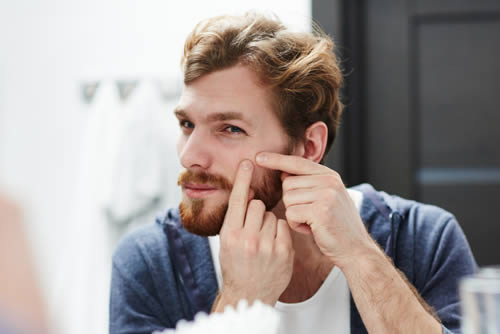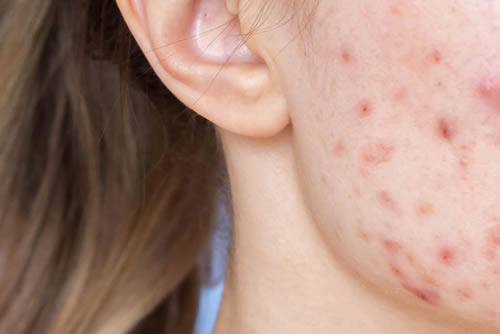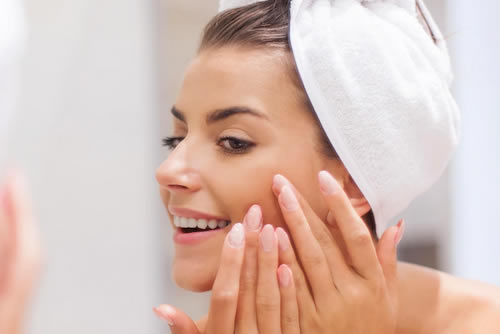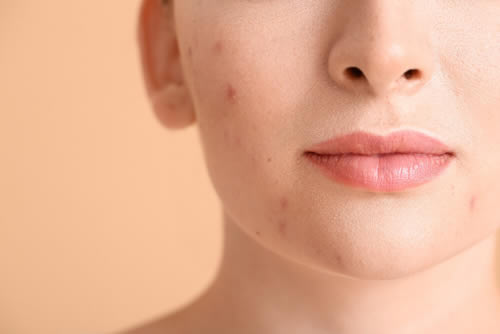
Blog
If you are an adult who is mortified to look in the mirror and see dreaded acne, don’t feel like you are alone. Both adult men and women suffer from this condition that they probably thought should have disappeared after puberty. The truth is that acne can occur into your 30s, 40s, and even 50s. It might be persistent acne that never went away after teenage your years, or it may be late-onset acne that makes its first appearance in adulthood.
Reasons for adult acne
There are a number of reasons that acne pops up during the adult years. Some common causes include:
- Hormones: Fluctuating hormones don’t stop when adolescence ends. Both men and women’s hormones fluctuate, although women experience it more during their menstrual cycle, pregnancy or menopause. This means women have adult acne breakouts more often than men.
- Stress: High levels of stress can trigger acne flareups in both men and women.
- Cosmetics: Hair and skin products place users at a higher risk for adult acne. It can be helpful to choose products labeled oil-free, non-comedogenic, or non-acnegenic to avoid clogged pores and resulting acne breakouts.
- Genetics: People may be predisposed to acne if a close relative experiences the condition in adulthood.
- Medical conditions: Acne is sometimes linked to medical conditions or medications. If adult acne is a problem, ask your physician if it could be a side effect of a drug or illness. Switching to a different medication or beginning treatment for an undiagnosed ailment may resolve your adult acne.
Treating adult acne
If acne is mild to moderate, trying some of the many over-the-counter wash and cream options may do the trick. Some people also choose home remedies like green tea, mint, witch hazel, tea tree oil, or apple cider vinegar. If these self-care methods aren’t effective, the best choice is to seek the help of an experienced physician like Dr. Bernard Raskin in Bakersfield. He and his skilled team will diagnose your specific acne problems and develop the best treatment plan to help eliminate your adult acne.
Contact our Bakersfield dermatology office today to schedule an appointment. We accept insurance.

Blog
The most severe type of acne is called cystic acne, in which deep and very inflamed acne develops on the face or other parts of the body. The breakouts may be large and can leave unsightly scars. These acne bumps or cysts appear under the surface of the skin and are filled with fluid and often painful.
What causes it?
All types of acne are primarily caused by too many dead skin cells in the pores, overactive oil glands, or a proliferation of acne-causing bacteria. Minor acne blemishes develop when a pore wall breaks near the skin’s surface and leaks infected material into the surrounding area. If a pore wall similarly breaks deeper under the skin’s surface, more severe blemishes can form. If the infected material leaks into adjacent pores, cysts may develop. This most severe kind of acne is usually not related to things like poor cleansing or making poor diet choices. Some people are just more prone to cystic acne than others. It has also been shown to have a genetic element, with parents who had cystic acne more likely to pass severe acne down to their children.
Can it cause scarring?
Because cystic acne damages healthy tissue, it is very common for scars to form in the skin. The best way to limit scarring is to stay on top of treating this type of acne. It is also important to avoid popping or picking at acne cysts, which will likely worsen the breakout and lead to skin damage and scarring. Many patients with this form of severe acne struggle with the embarrassing appearance of breakouts and the lingering effects of scars. This is another reason to get professional treatment from a skilled dermatologist like Dr. Bernard Raskin in Bakersfield.
How is cystic acne treated?
Strong medications are almost always required to adequately treat cystic acne, so seeing a professional is a vital element of treatment. Systemic medications that circulate throughout the body instead of just focusing on one part are a common choice for handling cystic acne. Some of the most frequently prescribed treatments include:
- Oral antibiotics
- Oral contraceptives for women
- Corticosteroid injections
- Accutane
- Surgical skin incision to access and drain the cyst
In can be difficult to gain control of cystic acne, so patients should remember to be persistent and follow the physician’s instructions carefully. Several treatment combinations may be necessary to find the right method for each individual patient. Working closely with your experienced dermatologist is the best way to successfully treat cystic acne.
Contact our office today to schedule an appointment to see what are the best option for dealing with cystic acne.

Blog
Acne breakouts can be embarrassing and frustrating, so preventing them may make you happier and more confident. There are some rather simple things you can do to help clear up your skin. If these tips do not work and your acne is more persistent or bothersome, seek the care of a skilled dermatologist such as Dr. Bernard Raskin in Bakersfield. But first, try these tricks to prevent breakouts.
Washing your face
A vital part of your daily routine should be washing your face to remove oil, sweat and dirt. Select a non-alcohol cleanser that is gentle and listed as safe for acne. Use a clean washcloth or hands and rinse well before patting your face dry. For best results, wash your face in the morning and before bed. Avoid washing your face more frequently to avoid drying out your skin.
Moisturizing your face
Another key step in your daily routine should be moisturizing your skin to provide a protective barrier, keeping your skin hydrated and limiting acne. Choose an alcohol-free moisturizer for your type of skin and apply it according to the directions.
Knowing your skin type
You have likely seen that many facial products target various skin types. Determine if yours is normal, dry, oily, or combination and choose products for that specific type of skin. You may even need to use different products on different areas of the face for best results.
Choosing the right makeup
Wearing too much or the wrong kind of makeup can increase acne breakouts. Avoid greasy formulas and opt for lighter product versus thick ones. Look for makeup that is labeled non-comedogenic, which means it does not contain harsh fragrances or chemicals.
Avoiding touching your face
Even clean fingers and hands can contain germs, so it is especially important not to touch your face especially in acne-prone areas. Resist popping or squeezing pimples, which may lead to worsening acne or scarring.
Avoiding the sun
Limit sun exposure and wear a broad-spectrum sunscreen with an SPF of 30 or greater to protect against dangerous UV rays. Some medications can increase your skin’s sensitivity to the sun so be extra cautious in that case.
Drinking water
If your skin is not well-hydrated, it may lose its protective barrier and become more prone to acne. Drinking at least eight glasses of water each day can help keep your skin healthy.
Eating healthy
Experts have created a list of foods that may trigger acne, such as refined sugar, dairy products, processed carbohydrates, and fried foods. Raising your blood sugar may increase your skin’s oil production and therefore cause acne breakouts. It is a good idea to try to eat healthy food that are known to prevent acne instead of cause it. Smart choices often include leafy greens, nuts, seeds, or colorful fruits and vegetables.
Using medications
There are many over-the-counter acne medicines available. Look for those containing benzoyl peroxide, tretinoin, salicylic acid, sulfur, or azelaic acid. These are all elements that have been shown to decrease or help with acne flareups. It is a good idea to seek professional care even when choosing non-prescription medications so that you have the safest and most effective results.
If you need to see a dermatologist in the Bakersfield area, contact our office today to schedule an appointment.

Blog
Nearly everyone has annoying acne bumps pop up now and then. Although it is often thought to be a condition for teenagers, it also occurs in adults and even babies. Acne occurs when hair follicles become clogged usually with oil or dead skin and may develop anywhere on the body.
Acne can range from mild to moderate to severe. When it is persistent and problematic, it may negatively impact your confidence and self-esteem. There are a number of types of acne, which is important to know for the most effective treatments. Common types of acne blemishes include:
- Whiteheads are small and round, occurring under the surface of the skin. They typically have a white or pale yellow color. Whiteheads often result from oily skin, puberty, hormones, or cosmetic use.
- Blackheads are similar but are dark in color. They rise to the surface of the skin and the air exposure causes oil inside to appear dark. Blackheads develop from oily skin, hormones, irritated hair follicles, cosmetics, or some medications.
- Inflammatory papules develop when a hair follicle or pore is clogged with bacteria and your immune system produces white blood cells to fight the bacteria. This usually causes unsightly red swollen papules.
- Inflammatory pustules are similar but contain pus inside that is full of oil, bacteria and dead skin. These bump clusters are usually larger, red and sensitive.
- Nodules are large, firm bumps under the skin that contain bacteria and oil that goes deeper into the skin. These can be painful and produce long-lasting scars.
- Cysts also occur beneath the skin and are the most severe type of acne. Cysts are filled with fluid and often occurs in menstruating women who are affected by varying hormone levels.
Mild to moderate acne may be treated at home with over-the-counter creams or face washes. Sometimes acne is more serious and benefits from a skilled dermatologist like Dr. Bernard Raskin in Bakersfield for accurate diagnosis and more effective treatments. Acne is a common condition that should not cause you to suffer or feel embarrassed. If your acne does not improve with self-care, schedule an appointment to get your acne under control.




